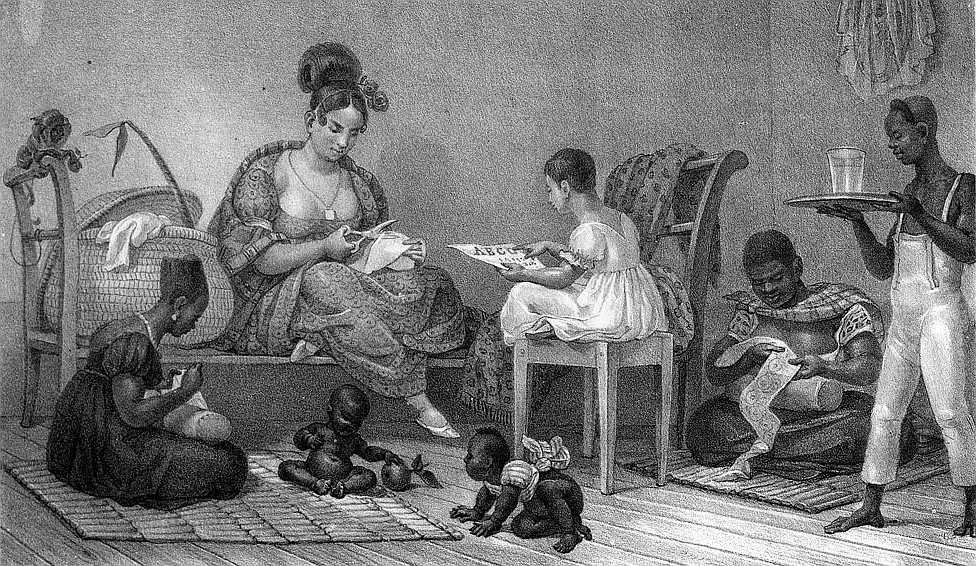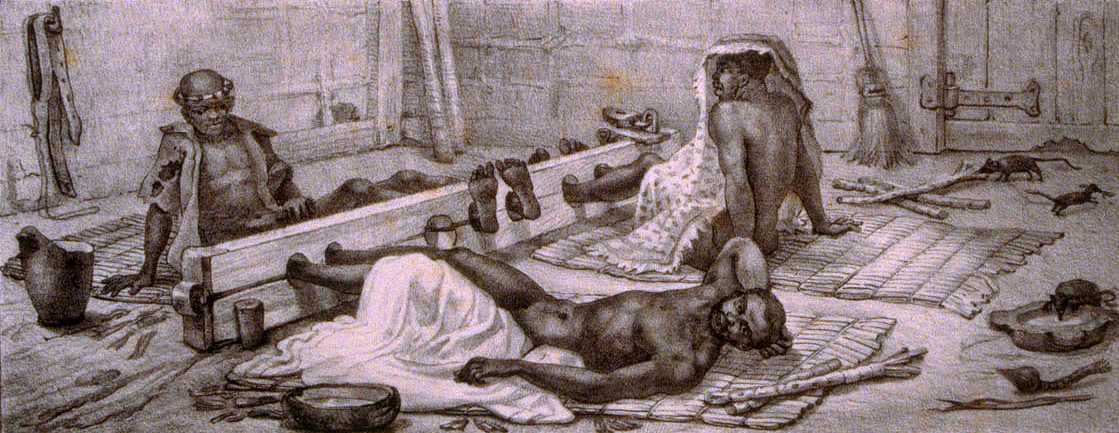
Punishment in stocks, Brazil -Jean Baptiste Debret - Image: Atlantic Slave Trade and Slave Life in the Americas
Excerpted from Brazil, a novel by Errol Lincoln Uys
"Uys re-creates history almost entirely at ground level, through the eyes and actions
of an awesome cast of characters.-- Publishers Weekly
August 1855 - January 1856
At daybreak on January 28, 1856, Antônio Paciência and seventy male slaves were awakened by their overseer guards in one of three barnlike dormitories on the fazenda of Saturnino Rabelo. The column had reached the fazenda near Sorocaba, sixty miles west of São Paulo, at the beginning of December; since then, the slaves who had come sixteen hundred miles through the northeast sertão and over the highlands of Minas Gerais had found life at Rabelo's barracks surprisingly easy.
Antônio Paciência was now nine, still very much the thin, gangly youth tall for his age, but with a longing, distant look in his big brown eyes. On the long march, he had learned much from the slave Policarpo, and others, all of whom had counseled him to abandon hope of returning to Jurema.
On the last stage of the journey, one theme had dominated the concerns of Policarpo and other slaves: the senhor to whom they would be sold.
Policarpo, from Mozambique, was in his late twenties. He had had two masters in the thirteen years he had been in Brazil - one a Recife merchant, a Portuguese Jew, and the other a cotton grower.
"Why did the Jew sell you?" Antônio Paciência had asked.
"Why?" Policarpo said. "I don't know why. Nothing was said: One morning we got up and were ready for work, but were taken to the slave market instead." "Your master was angry?"
"He was calm. He took us to the market, with the few things we owned. That was the last we saw of him."
"And the other one? Why did he sell you?"
"Pascoal Sampião? Ai, yes - God is merciful."
The cotton grower and his overseers had lashed Policarpo and locked him up in the tronco, the stocks, more times than he could remember. "Not the tronco simples," Policarpo added, when Antônio Paciência mentioned that his stepbrother had sometimes sat with his legs in the tronco at Jurema for being filled with cachaça. "The tronco duples!" Policarpo said, holding his wrists up and giving a look of mock terror. "Tronco diabo!" The double stocks, where you sat with your body hunched forward, your legs through two lower holes, your arms through two upper holes, for the duration of your punishment, day and night.

Punishment in stocks, Brazil -Jean Baptiste Debret - Image: Atlantic Slave Trade and Slave Life in the Americas
"Pray, boy, that the one who buys you is not like the keeper of dogs I knew," Policarpo had said.
"My senhor will be a good master," Antônio Paciência had replied, with blind confidence.
At the fazenda of Saturnino Rabelo, for almost two months now, Antônio Paciência had eagerly awaited the day he would see his new owner. For the first two weeks, there had been no work, just hours lazing beneath the trees outside the dormitories. Morning and night, they were fed copious quantities of food. During the next six weeks, they had worked in Saturnino Rabelo's fields.
"Why doesn't the Portuguese bring our new owners?" the boy asked Policarpo.
"Patience, Antônio Paciência! Patience," Policarpo said. "They'll come."
"Why do we wait?"
"Look around you, boy. What do you see?"
Antônio Paciência didn't know what Policarpo was driving at.
"Slaves?" he ventured.
"Slaves, yes - slaves who walked sixteen hundred miles. This Saturnino Rabelo sees, too, and he doesn't hurry us to market. Even the smallest calf like Antônio Paciência must be fattened for the better price he will fetch!"
This January morning, when the bell rang and the overseers hollered for all to rise, the slaves knew that the days of fattening were over: At roll call the previous evening, Rabelo had announced that the first group of fazendeiros with whom he dealt were coming to make their selection. Rabelo had exhorted the slaves to do their utmost to gain acceptance by the senhores: "You'll be inspected: Stand straight; keep your eyes bright and lively. You'll be asked questions: Answer immediately - no lies, only the truth."
Antônio Paciência got up off the straw mat where he slept. He walked behind Policarpo as the slaves filed out of the dormitory and streamed toward an open cook ing area, where others who had woken earlier stood at cauldrons of porridge and weak coffee.
After the meal, 175 slaves were separated into batches: those in prime condition, who were to be sold individually; a mix of the strong and the weak, to be offered in lots; thirty-eight women and girls to one side; and the moleques - little black boys - and three mulatto children, Antônio Paciência among them, kept separately.
When the slaves were settled down and ready for the fazendeiros, Saturnino Rabelo walked among them, showing special satisfaction with the appearance of Policarpo and thirty other males whom he considered his most outstanding stock. Their upper torsos gleamed in the sunlight, a glossy, healthy sheen obtained as the result of Saturnino Rabelo's longstanding instructions that prior to auction, the skin of peças be rubbed with pan grease.
By ten o'clock, Saturnino Rabelo was conducting three parties of prospective buyers on an inspection of the slaves. Rabelo was particularly attentive to one fazendeiro who was seeking no fewer than thirty purchases and whom he knew to have the means for this enormous investment. Rabelo escorted the fazendeiros from one group of slaves to another and was quick to point out desirable features:
"Not a raw savage among them; each one broken in by his owner in the north," Rabelo said to the fazendeiro. "Not one with less than five years' service. I suppose the Englishmen must be thanked for this: Without them, there would have been no need to drive the slave herd from north to south. But damn them anyway! I was a wealthy man, senhor. British cruisers took my ship in the bay of Porto Seguro - my ship and eight hundred slaves! I ask you, Your Honor, was that not plain theft? Was it not an invasion of Brazil's waters?"
Since 1819, the British antislavery movement had been agitating for an end to the slave traffic between Africa and Brazil.
An abolition law providing stiff penalties for importing blacks, confiscation of slavers' ships, and liberation of their captives had been passed in 1831. During the next twenty years, despite the law and patrols by British cruisers ordered to enter Brazilian territorial waters in pursuit of illegal slavers, at least 600,000 Africans had been landed in Brazil.
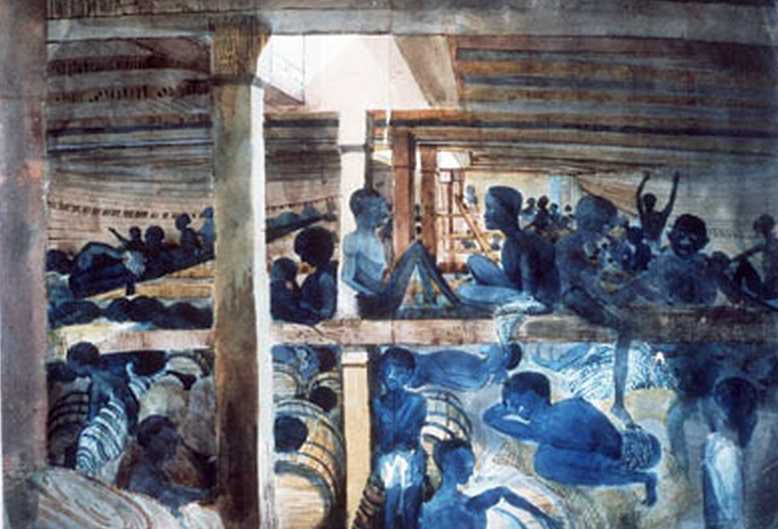
By the month of May 1850, when Saturnino Rabelo had been caught at Porto Seguro, the aggressive stance of the British navy in invading Brazilian territorial waters and threatening a blockade of Brazil's ports had finally led to an effective ban on the African slave traffic by the imperial government at Rio de Janeiro. And by 1853, the illegal imports had dropped to a few hundred. In the three centuries since Nicolau Cavalcanti, the founder of Engenho Santo Tomás, had stood on the beach at Recife to greet the arrival of the first sixty peças shipped from Mpinda at the mouth of the Congo, 3,650,000 blacks had been transported to Brazil, almost ten times the number that had reached English America.
"Eight hundred slaves, senhor," Saturnino Rabelo continued to complain. "I was locked up for a year and fined - it's been five years and I still owe others for loans to pay those fines."
"Some fine-looking blacks here, Saturnino Rabelo," the fazendeiro said, observing the group with Policarpo. "You chose well."
"Thank you, Your Honor. I never buy one I haven't personally inspected. When we arrive to buy slaves for the south, their owners will do anything to hide their vices and defects. And the cost? Each journey I make, they ask for more money."
The ban on the slave trade between Africa and Brazil had come at a time when the coffee growers' demand for labor was never greater, with their boom crop already contributing half of the world's supply: Thus this new traffic within Brazil, thousands of slaves being bought and transported annually through the sertão, like Rabelo's column, or huddled together on the decks of ships sailing from northern ports to Rio de Janeiro and Santos. The inter-provincial slave traffic was as barbarous as the African trade had been, but was sanctioned by the imperial government.
The fazendeiro to whom Saturnino Rabelo addressed his remarks was in his late sixties, a man of medium height and dignified bearing, who, despite the heat, wore a frock coat of English broadcloth, black trousers, and a high black silk hat that made him seem taller than he was. His upright carriage was helped, too, by a corset, which, though now out of fashion, the fazendeiro continued to use, suffering the discomfort of tight stays rather than reveal a spreading paunch. He had deep-set eyes, gray-green and flinty, and a broad forehead. His full mustache and whiskers were white and perfectly groomed. He carried a light cane, and about his neck he wore a gold chain reaching to a heavy watch fob in his waistcoat pocket. A sweet and powerful perfume didn't quite mask the unpleasant odor from a body encased in apparel more suited to northern climes.
Walking just behind the fazendeiro was a pale, slender youth, the fazendeiro's grandson. The young man was dressed in similar fashion with frock coat and black hat. He had similar gray-green eyes, with a brightness that contrasted strikingly with his earnest countenance. The youth was a student at the São Paulo school of law, where he should have been in attendance but for his recuperation from a serious stomach ailment.
The fazendeiro carrying himself with all the dignity of an English country gentleman was Ulisses Tavares da Silva, the son of Silvestre Pires da Silva, who had been the first to break from the nomadic ways of his bandeirante ancestors and from the daring canoe convoys of his own father, Benedito Bueno, grand admiral of the seasonal monsoons. Silvestre da Silva had turned his back on the mighty rivers and infinite sertão to devote himself to his nine children and the raising of sugarcane at Itatinga, there within a great bend of the Rio Tietê, 125 miles north-northwest of the city of São Paulo.
Ulisses Tavares had been studying law at Coimbra University in Portugal in 1807 when the Braganças moved to America; but the eighteen-year-old Paulista along with some fellow students, stayed in the beleaguered country and took up arms against the French. In September 1810, seven months before the French were finally expelled from the kingdom, Ulisses Tavares, now lieutenant of the infantry, was wounded at Bussaco, where 51,000 British and Portuguese had defeated 65,000 Frenchmen. When he was fully recovered, he did not complete his studies at Coimbra but, in 1811, returned to Brazil.
In 1816, Ulisses Tavares had again gone to war, this time during the conquest of the Banda Oriental, returning to Itatinga in 1819 with all the honors of a war hero. He had gone into politics, first on the county level at Tiberica, then in provincial government on the eve of Pedro I's call for independence at Ipiranga. His politics were conservative and strongly antirepublican, influenced by Silvestre, who had remained an avowed monarchist and liked to cite the fate of his cousin André Vaz da Silva, a participant in the Inconfidência Mineira. (A report had reached Itatinga six years after André's banishment to Mozambique: The exile had died of fever in September 1798 while exploring Central Africa.)
However, there was one royal personage for whom Ulisses Tavares had only contempt: Emperor Pedro I. As a veteran of the conquest of the Banda Oriental, Ulisses Tavares had been disgusted by the loss of that new Cisplatine Province of Brazil in 1828. He had not served in that second war, for in the year of the insurgency, Silvestre Pires da Silva died and responsibility for Itatinga had passed to Ulisses.
Like others, Ulisses Tavares believed that Brazil's natural southern boundary lay at the Rio de la Plata. "Uruguay!" There was always derision in his expression of the new country's name. "We were robbed of our territory by bandits - and by an emperor who surrendered the most vulnerable flank of his realm!"
Ulisses Tavares had continued in provincial politics during the early years of Dom Pedro Segundo's reign, but had become increasingly involved with the development of Itatinga. In the mid-1830s, fazendeiros above the Rio Tieté and northeast of Itatinga had begun to grow coffee. A decade later, Ulisses Tavares decided to undertake a month-long tour of Rio Claro, Campinas, and other districts in this area, and came to the realization that the rolling hills behind the riverine headland at Itatinga were ideal for coffee bushes, since they were rich in terra roxa, the purple earth, considered most suitable for this crop. By 1855, the fazendeiro was working 112 slaves at Itatinga and had planted more than 300,000 coffee bushes on one thousand acres of land.
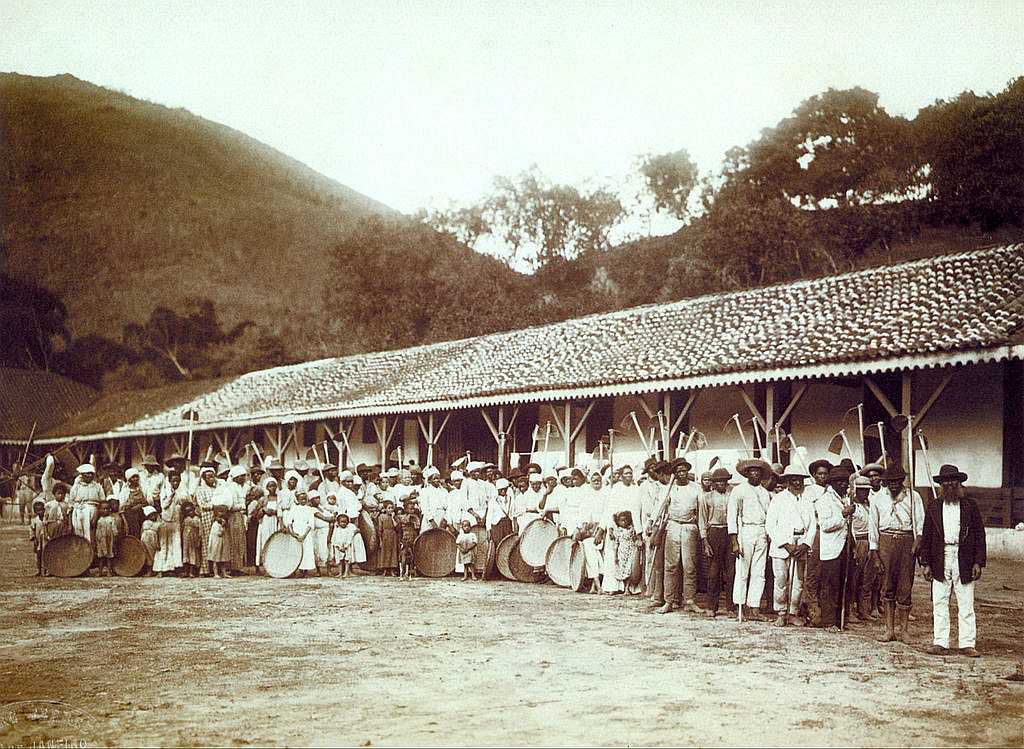
On January l0, 1853, Dom Pedro Segundo, in recognition of the fazendeiro's services to the empire, made Ulisses Tavares da Silva a baron, with his title derived from the great lands he owned: Barão de Itatinga.
Accompanied by his favorite grandson, Firmino Dantas da Silva, the baron strode slowly among the slaves at the barracks of Saturnino Rabelo this January morning, halting often to single one out with his cane and quickly bringing the individual to his feet.
"What is your name?"
"Policarpo, senhor."
"Where do you come from?"
"Mozambique, Master."
Saturnino Rabelo interjected: "In my fields, Your Honor - a strong and uncomplaining worker." There was a belief that blacks from Mozambique and Angola were natural enemies of labor, as opposed to those from the Gold Coast, who had a reputation for diligence.
"Do you want to work for me, Policarpo Mossambe?"
"Yes, senhor. I will work." Policarpo's head was bowed.
"Docile, Barão," Rabelo suggested. "The Pernambucano who owned him was
a thorn in the side of slaves, a man not to be disobeyed."
"Nor I, Senhor Rabelo." Ulisses Tavares jabbed the air with his cane. "Turn around," he told Policarpo, and pointed to scars on the slave's back. "Docile?"
"The Pernambucano wasn't a patient man, and his overseers were freed blacks who believed the chicote was the only means of teaching right from wrong." "But did this Mossambe learn?"
"I believe he did."
"How would you know, Rabelo?"
"Policarpo gave no trouble on the journey. When he was rested, I put him among the sugarcanes. A good worker, Your Honor."
Ulisses Tavares's brow contracted. "Why did they beat you, Policarpo Mossambe?"
"It was necessary to learn, Master." Policarpo knew well enough not to challenge the reasons for his lashings, here in front of a senhor who might be his next owner. "You learned obedience and respect?"
"Yes, senhor . . . I learned."
"I hope so, Policarpo Mossambe." And, to Rabelo: "I'll buy this Mossambe." "Yes, Your Honor!"
"Jesus Christ be praised!" Policarpo intoned. An illegal import to Brazil, Policarpo bore no royal brand on his breast, but a traveling padre had baptized him at the fazenda of Pascoal Sampião. Not once had Policarpo been inside a church, and the mysteries of the faith were unknown to him, but he had learned that such statements pleased masters.
"Praise Him," Ulisses Tavares responded just above a whisper.
Policarpo stepped over to eleven chosen slaves, who murmured approval of his selection, for he was popular among them.
Ulisses Tavares took almost two hours to pick twenty-five males and five females. The other coffee growers, also from the district of Tiberica, were men with smaller properties and great respect for the barão; they waited until he had made his selection before indicating the sixteen slaves they wanted to buy.
Antônio Paciência sat with the moleques and the two other mulatto boys. He had seen Policarpo taken from the main group and had kept his eyes on Policarpo's new owner, hoping that the fazendeiro would come to him. But the White Beard had not done so, and sitting there in the hot sun, realizing that Policarpo would soon leave him, Antônio Paciência felt again the misery of parting such as he had known that day at Fazenda da Jurema.
An hour passed before the sale was concluded. The overseers the fazendeiros had brought to Rabelo's barracks stepped up to claim their new charges.
Suddenly there was a shout, and a black boy next to Antônio Paciência scrambled to his feet.
"You, too!" one of Rabelo's guards shouted. "All of you! Get up!"
Antônio Paciência was the last to rise. "Over to the senhores. Quickly! Quickly!"
They were lined up in front of the veranda. The White Beard stepped down to them with Rabelo.
Antônio Paciência felt his limbs trembling, but he tried to stand up straight. He felt fright and shame but a desperate hope, too, that he would go with Policarpo. Please, Mãe Mônica, his thoughts appealed. Policarpo is good to me.
Ulisses Tavares did not take long to make up his mind. Even as he stepped to ward the boys, he had immediately liked the look of the dark-skinned mulatto, with his big eyes and open, honest face.
"What's your name, boy?"
"Antônio Paciência."
The baron smiled. "Where did you get such a name?" "From Mãe Mônica . . . senhor."
"Do you want to come with me, Antônio Paciência?"
He looked up, and in his relief, he smiled. "Oh, yes, senhor . . . thank you, senhor!"
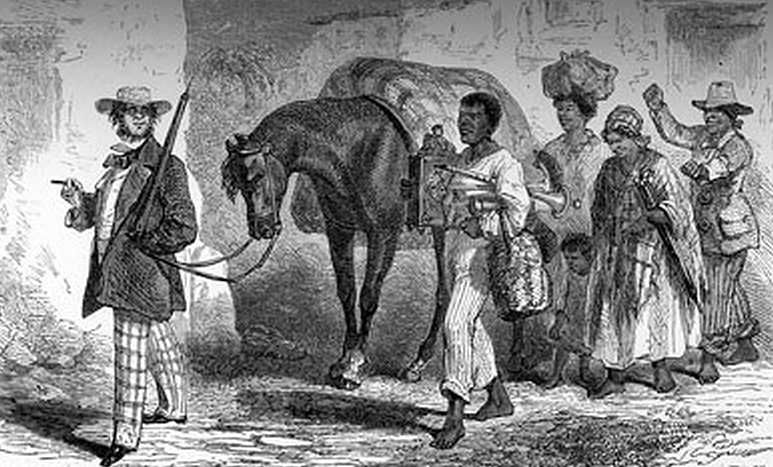
Antônio Paciência and the thirty adult slaves bought for Itatinga were transported from Rabelo's barracks in two mule-drawn wagons that reached Tiberica on January 31, 1856. Ulisses Tavares da Silva and Firmino Dantas had kept ahead of the wagons, spending the two nights at fazendas of relatives along the way; when the slaves arrived at Tiberica, the barão and his grandson were waiting for them.
Late this morning, the wagons were pulled up to one side of the town square in the shade provided by the walls of a pretentiously huge church, the building of which had started thirty-three years ago in the days of Silvestre da Silva. Tiberica was now a busy provincial center with eighteen hundred inhabitants, but the church was still far from complete, though a section had been roofed and consecrated for worship.
The slaves were warned not to wander away from the wagons, which would have been difficult with the overseers watching them from the front of a store where they had gone to quench their thirst, one with doses of cachaça, the two others with warm drafts of Tennant's fine English ale.
Now the senhor barão's grandson came over to the wagons:
"Boy!" Firmino Dantas called to Antônio Paciência. "Come with me!"
Firmino Dantas headed toward the most prosperous store in Tiberica - Silva and Sons - which belonged to José Inocêncio da Silva, Andre Vaz's orphaned son,who had been raised by Silvestre da Silva.
Antônio Paciência hesitated when he saw Firmino Dantas at the entrance to the store.
"Don't be afraid."
Antônio Paciência took a few steps forward but again stopped.
"Come, child. The senhor is waiting."
Firmino Dantas looked at him sympathetically. "This is not a punishment. No one will hurt you."
What does the master want with me, Mãe Mônica? He shuffled forward nervously.
Twenty minutes later, as he stepped out of the store, Antônio Paciência had a partial answer to these questions, which only increased his confusion. Inside the store, he had been treated with amazing kindness.
The senhor barão himself had gone across to a tall glass jar, lifted out a ball of pink candy, and popped it into Antônio Paciência's mouth. Never had he tasted such a marvelous sweet! Then the senhor barão had given him a white blouse of soft cotton with a big collar, long gray trousers with thin red stripes down the sides, and, most impressive of all, a pair of bright red braces with which his pants were hitched up.
He had not been given shoes, for those were not for slaves, and the senhor barão, amid the satisfaction he showed in having Antônio Paciência dressed so handsomely, had warned that he expected the boy to take great care with these clothes that had cost many reis. "Oh, yes, senhor! My beautiful clothes! Oh, my Master, Antônio Paciência will look after them!"
Outside the store, Antônio Paciência again hesitated momentarily at Firmino Dantas's order to walk ahead. He was afraid that out in the open, sitting on the ground with the other slaves, he might spoil the wonderful new clothes he had been given.
There was no need for Antônio Paciência to worry about spoiling his clothes. Firmino Dantas took him to the barão's open carriage, where he was put beside the driver for the trip to Itatinga. The carriageman was a mulatto slave, a great burly fellow called Cincinnato, who put on a friendly display of mock obeisance to the boy, bowing to him, praising his garments, and helping him up to the carriage seat.
For the first time since leaving Jurema, the boy took a delight in the journey. Six miles north of Tiberica, the carriage entered the da Silva property, the clatter of iron-shod hooves sending flocks of brilliant-feathered birds into the highest branches of the forest. The jungle was alive with sound and color and exotic plants unknown to Antônio Paciência. He gazed about him in awe and a little fear.
Three miles from the main settlement at Itatinga, the forest ended abruptly at the line of advance of the newest clearings. Majestic tree trunks still dotted the hillsides, their columns tall, black, and blasted by the inferno that had raged around them. Half a mile onward and the scene again changed, with the first rows of dark green young coffee plants waving amid a protective growth of other crops. Nearer the settlement, endless rows of older trees up to twelve feet high grew on the hillsides.
Some agregados had built their homes beside the road. Those outside when the baron's carriage approached greeted it respectfully, men removing their hats and pressing them to their chests, women bending their bodies with a motion suggestive of a royal curtsy.
Two hours after leaving Tiberica, the carriage crested a hill beyond which the ground sloped gently to the headland at the great bend of the Rio Tieté, with the Place of White Stones - Itatinga. The old house of Benedito Bueno was still there, an ugly rammed-earth building now used as a coffee store and slave infirmary. Off to the right, amid tufted royal palms and luxuriant bushes and flowers, stood the mansion occupied by the barão de Itatinga and his family. It was a sprawling whitewashed building with two ells extending backward. There were twenty outbuildings, all neat and whitewashed, the largest group of which housed the slaves. One hundred yards in front of the main house was an immense open area of stamped earth, the terreiro, where coffee beans were dried.
Cincinnato halted the horses at the front entrance of the mansion, where a flight of stone steps led up to a small open veranda with wrought iron railings. The baron and his grandson got out of the carriage. "You, too, Antônio Paciência," Cincinnato said. "Climb down and wait there, at the bottom of the steps." Antônio Paciência did as he was told. "When he wants you, the barão will send for you."
"For what?"
"Be patient, Antônio. You'll find out soon enough."
Antônio Paciência waited for ten minutes. Cincinnato had taken the carriage to a shed near the house, and the boy stood watching him as he unhitched the horses. Then the senhor barão himself appeared in the doorway: "Come up here, Antônio Paciência."
He climbed the steps quickly, but paused opposite the entrance to the house.
The baron stepped across the veranda to him. "Antônio, you must learn to keep your clothes neat." The baron tugged at the tail of the boy's shirt. "Tuck it in!" When Antônio Paciência tried unsuccessfully to comply, Ulisses Tavares helped him. "There!" he said. He straightened the collar of the boy's blouse. "Good," he said, stepping back. "Good!"
At that moment, Antônio Paciência saw the young Senhor Firmino Dantas in the doorway, and with him, a little mistress in a blue dress whom the boy took to be the sister of Senhor Firmino. The sinhazinha was much younger, short and with dimpled cheeks; she moved her pink hands excitedly and kept her fiery black eyes on Antônio Paciência.
"Well?" the barão asked. "What do you think?" "Oh, yes! Yes, Senhor Barão!" the girl exclaimed. "He's called Antônio Paciência."
The girl giggled with delight.
Her name was Teodora Rita Mendes da Silva, and in a week's time she would celebrate her thirteenth birthday. She was tempestuous, with the fire seldom absent from her small black eyes and with a sharp tongue, but she was a lively, enchanting creature, especially when others gave her their undivided attention. This she had no difficulty at all commanding, for Teodora Rita Mendes da Silva was the wife of Ulisses Tavares, baron of Itatinga.
Two years ago, the barão, a widower for eleven years, had met the child at the house of her father, Emilio Mendes, a wealthy fazendeiro of Tiberica county and dear friend of Ulisses Tavares. The fresh bloom in Teodora Rita's rosy cheeks and her blazing eyes had warmed the heart of the then sixty-five-year-old baron. Eight months ago, an emboldened hero of Bussaco and the Banda Oriental had strapped himself into his corset and had donned his black suit for a long interview with Senhor Emilio and a request for this little flower to brighten the days of an aging barão. Senhor Emilio, an observant man, had shown no surprise, for Ulisses Tavares's visits to his house had been frequent and his doting upon the girl quite open. Senhor Emilio had no objection to the betrothal of Teodora Rita, though he wondered how long the senhor barão's ardor would last. So had many others, but not Ulisses Tavares, who after these first seven months with his child bride remained as happy and charmed as when he had first set eyes upon his little baronesa.
"Oh, yes, Senhor Barão!" Teodora Rita repeated. "What a lovely little boy!"
Antônio Paciência saw the somber-faced Senhor Firmino Dantas smile for the first time.
The baron of Itatinga's features broke into a broad grin, so pleased was he with his wife's reaction. "Antônio Paciência is yours, my sweet angel," he said. "A gift for your birthday."
